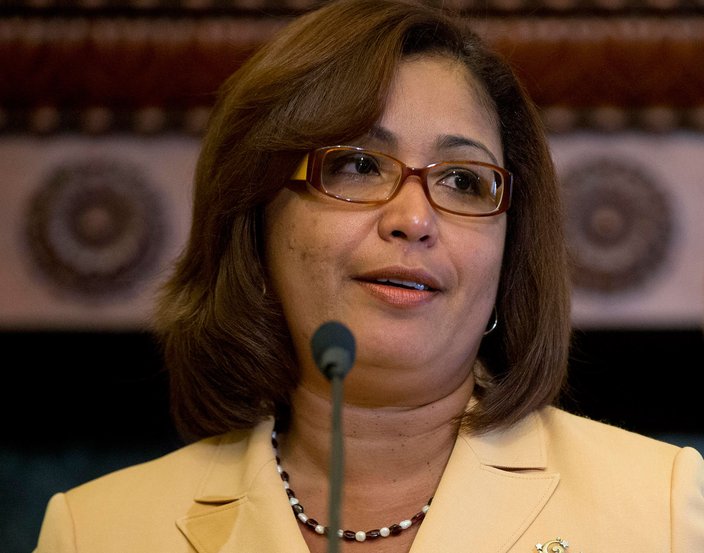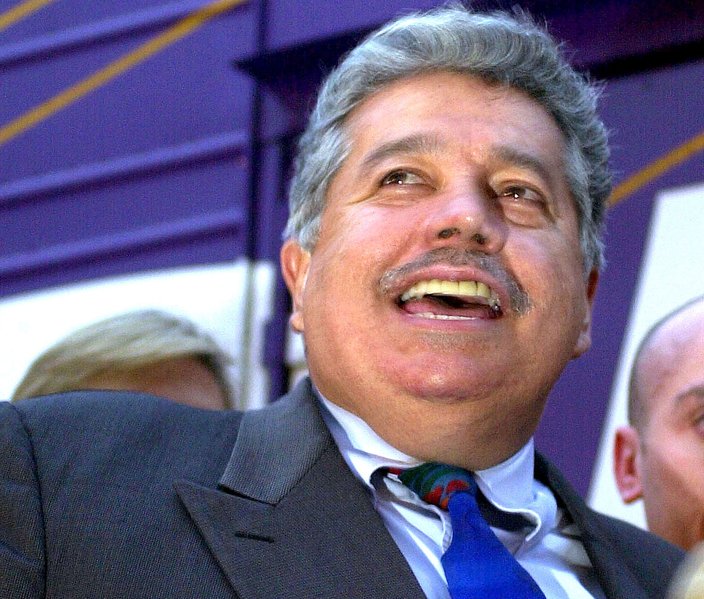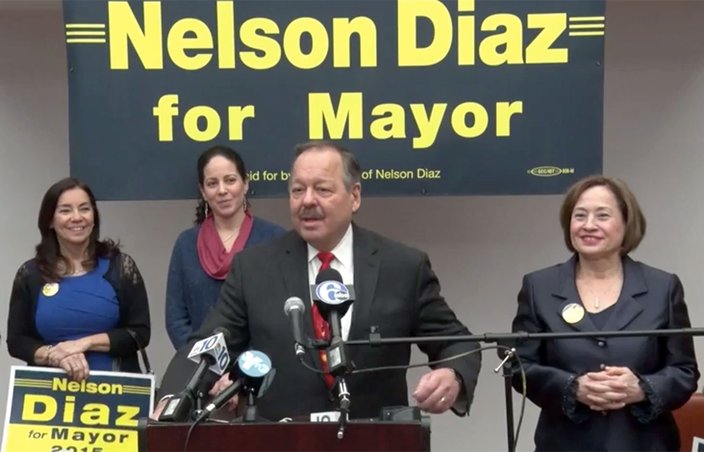
February 06, 2015
The election of Wilson Goode as mayor in 1983 stands as a landmark moment in Philadelphia’s storied — and, at times, beleaguered — political history.
Not only did Goode become the city’s first black mayor, but, to many, his election signified the emergence of the black voting bloc. Recognizing the power their numbers provided, African Americans mobilized, demanding — and gaining — a greater role in city politics.
A handful of Latino politicians also rode that wave into office. But unlike African Americans, who now wield considerable political clout, Latinos have yet to experience a burgeoning power surge in Philadelphia.
Despite a rapidly growing population, Latino political representation remains about the same as it was 30 years ago. Latinos hold just one of the 17 city council offices and only two of Philadelphia’s 35 state legislative offices. The city has yet to elect a Latino mayor or Congressional representative.
That stands in stark contrast to cities like New York and Chicago, which have elected a considerable number of Latinos to city, state and federal offices. At 12.3 percent, Philadelphia’s Latino population is significantly smaller — and poorer — than those cities, but also expected to grow at a higher rate over the next 15 years.
Gerrymandering, infighting and low voter turnout have stunted Latino political growth. Yet if the city’s 187,000 Latinos recognize the potential their numbers provide, Latino leaders say the political landscape could shift.
One Latino leader wondered whether the mayoral primary, which features the city’s first Latino candidate, can be the catalyst for such a movement, much in the way Goode galvanized the black community decades ago.
“That gave birth to a political movement,” said Angel Ortiz, the city’s first Latino councilman. “But the activism on those years has sort of died down and there’s only embers out there of that. What we need is to stoke those embers and fire them up.”
W. Wilson Goode's landmark election as Philadelphia mayor in 1983 signified the emergence of the African American voting bloc. Latinos, however, have yet to experience their power surge, despite significant population gains in the city. (AP Photo/Rusty Kennedy, File)
Ortiz was elected to an at-large council seat in 1983, having received the backing of a thriving African American coalition, progressive organizations and, to a lesser extent, Puerto Ricans.
Two years earlier, Nelson Diaz — now a mayoral candidate — had been appointed as Pennsylvania’s first Latino judge. In 1984, Ralph Acosta was elected to the state House, the first Latino to serve there since German Quiles served a lone term from 1969 to 1970.
Latinos appeared to be making some inroads in Philadelphia’s political scene. But electoral growth has not matched the population gains of Latinos, the city’s most rapidly growing demographic.
City council has had one Latino member, from Ortiz to Juan Ramos to Maria Quiñones-Sánchez. Latinos also represented just one state House District until 2013, when J.P. Miranda joined Angel Cruz in Harrisburg.
Rafael Collazo, director of political campaigns for the National Council of La Raza, placed much of the blame on redistricting, saying Latinos have been gerrymandered out of power throughout the city.
“The political process of redistricting has been a big challenge as far as growing our state power,” Collazo said, noting similar struggles have played out in Allentown and Reading. “That’s definitely been part of the history and part of the struggle.”
Philadelphia had a concentrated Latino population able to support a pair of state House seats for some time, Collazo said. Yet, that second seat — the 197th Legislative District — only was secured after a lengthy redistricting fight following the 2010 Census.
“The electoral map was drawn in a way that was more equitable to the people who lived here,” Collazo said. “It would have been nice if that would have happened 30 years ago.”
The Seventh Councilmanic District also was the subject of debate for years. In an attempt to save former Councilman Rick Mariano’s seat following the 2000 Census, the district was redrawn in such a zig-zag fashion that one analytics firm dubbed it the most gerrymandered local district in the country.
Nevertheless, the Latino population continued its rapid increase within the redrawn district, enabling Quiñones-Sánchez to become the first Latina elected to city council in 2007.

“I’m the only incumbent that doesn’t get endorsed (by the Democratic party)," says Maria Quinones-Sanchez, on City Council since 2008. "They’re actively looking for a challenger.…" (AP Photo/Matt Rourke, File)
State Rep. Leslie Acosta easily won a four-way race for the 197th Legislative District last spring, defeating the incumbent Miranda, who faced criminal conspiracy charges, and two other challengers. (Miranda and his sister pleaded guilty in Common Pleas Court last month to putting a "ghost employee" on his legislative payroll.)
All four candidates were Latino, a factor that spoke to a political structure Acosta described as fragmented. That segmentation — coupled with some frustration at the Democratic Party — has hampered Latino political growth.
“There is no unity because people have competing ideas and competing ideologies,” said Acosta, the daughter of Ralph Acosta. “That gets into the way and instead of uniting behind a candidate that is Latino, we often run another Latino against a Latino because we want to show our political muscle and strength.”
Acosta, who gained party support following Miranda’s troubles, also defeated former state Rep. Ben Ramos and Danilo Burgos, a candidate supported by the Latino Empowerment Alliance of Delaware Valley, a grassroots group backed by Quiñones-Sánchez and her husband, Tomas.
Quiñones-Sánchez said LEAD is committed to presenting progressive candidates dedicated to empowering the Latino community. She has grown frustrated by the Democratic Party establishment, saying it has failed to embrace such leaders.
“I’m living the same story,” Quiñones-Sánchez said. “I’m the only incumbent that doesn’t get endorsed. They’re actively looking for a challenger. … To me, I feel I have every single Democratic credential needed to be embraced by my party.”
Ortiz, who also at times struggled to gain the party’s endorsement, said party leaders lacked the vision to open up leadership positions for the growing Latino population.
“I don’t think the party structure really has viewed us as an electoral force, which we could be,” Ortiz said. “We haven’t proven it, but we could be. It is up to us really to make that point.”
Becoming such a force first will require unity, Latino leaders said.
“We have the numbers, we have the power,” Acosta said. “We just need to use that power and that structure in our favor so that we can see more people elected in positions of power.”

"Your vote should be the big hammer — the hammer that makes politicians respond to your interest," says former City Councilman Angel Ortiz. "I don’t think we have the consciousness yet.” (AP Photo/Dan Loh, File)
Energizing those numbers on Election Day has been a struggle, at times, for Latino political leaders.
Latinos roundly supported Barack Obama in 2008 by turning out at 50 percent, their highest rate for a general election in the last 15 years, according to an AxisPhilly analysis. Yet, their turnout paled in comparison to the 67-percent overall turnout, continuing a well-established trend.
Latinos again turned out for Obama in 2012, but gaining greater voter participation in lower-level races has been difficult. Leaders cited a lack of viable candidates and a disbelief in the electoral process.
“We’ve got to make them believe that your vote counts,” Ortiz said. “Your vote should be the big hammer — the hammer that makes politicians respond to your interest. I don’t think we have the consciousness yet.”
Collazo insisted inroads are being made, saying that the Latino community’s mobility and relative youthfulness are often overlooked in voter turnout analyses.
Many analyses only look at the most concentrated Latino wards, failing to account for Latinos living elsewhere in Philadelphia, Collazo said. Also, younger populations do not vote in same numbers as older groups, another factor impacting Latino turnout.
Nonpartisan and partisan organizations have worked hard to increase voter registration and better educate Latino voters, Collazo said.
“Slowly, but surely, those things bear fruit,” Collazo said. “There’s definitely been a lot of interest, a lot of focus and a lot of energy put into voter registration.”
Yet, Latinos have lacked viable candidates willing to engage and empower the Latino community, said Nelson Diaz, a former city solicitor and general counsel to the U.S. Department of Housing and Urban Development.
“I just don’t believe they’ve had anything to vote for, to some extent, and sometimes feel alien on their own lands, not realizing that the only way you can really get services is that elections matter,” Diaz said. “They have to understand that elections matter.”

“I really believe, because of our grassroots and my involvement in our community, we’re going to have a higher turnout than we traditionally have had in a primary,” says Nelson Diaz. “I believe that I will win.” (Jose Hernandez / YouTube)
Four decades ago, Diaz was among some 10,000 volunteers pushing to elect Charles Bowser as mayor. Their efforts were not enough to turn Bowser into Philadelphia’s first black mayor, but they paved the way for Goode.
Now, Diaz has his own mayoral aspirations. And he is confident he not only can unite the Latino community, but also gain the support elsewhere to win.
Diaz pledged to increase Latino voter registration figures, boost church participation and attract grassroots support. He also expects to gain backing from various other communities he has assisted over the years.
“I really believe, because of our grassroots and my involvement in our community, we’re going to have a higher turnout than we traditionally have had in a primary,” Diaz said. “I believe that I will win.”
When Diaz formally announced his mayoral campaign in January, he was the second Latino candidate. But former city solicitor Ken Trujillo withdrew his candidacy to tend to family matters, leaving Diaz as the only Latino in the race.
Diaz has not gained the media publicity of Anthony Williams, Lynne Abraham or James Kenney, but his campaign insists his candidacy is just as viable.
“Latinos turn out as a baseline at 20 percent … without really having a candidate that inspires them or really being engaged as a community,” campaign manager Ian Rivera said. “What’s going to happen when you go into those communities and make it about their issues and pay specific attention to them and also make it about ethnic pride?”
The hope is for a greater Latino turnout. And if it somehow matches Obama levels, maybe Latinos will have their own Wilson Goode moment.
“That could send a very, very huge message whether Mr. Diaz wins or not,” Ortiz said. “That could send a new message and bring forth a new realignment, really, of how political power is looked at in the City of Philadelphia.”